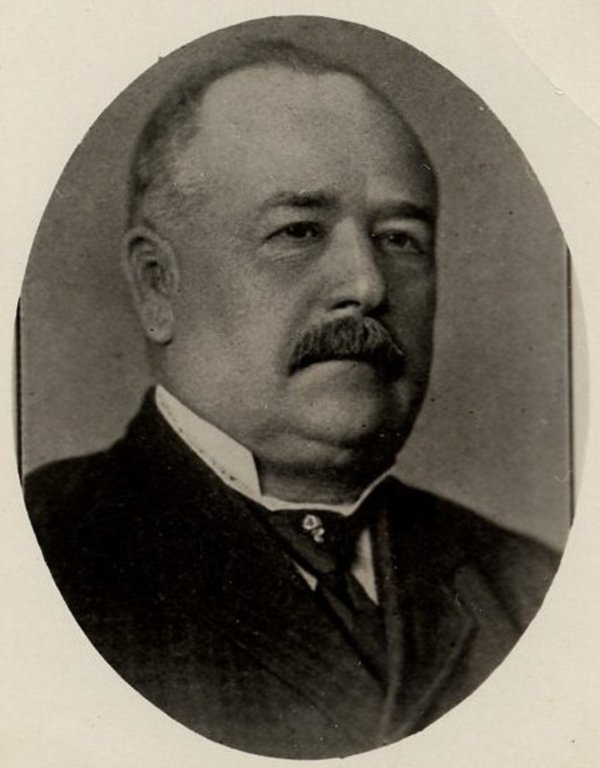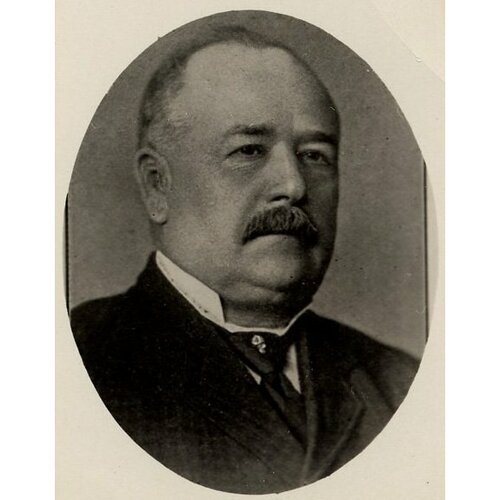
Source: Courtesy of Wikimedia Commons
TOURIGNY, PAUL (baptized Napoléon), merchant, land speculator, farmer, politician, and industrialist; b. 2 Nov. 1852 in Saint-Christophe-d’Arthabaska, Lower Canada, son of Landry Tourigny, a farmer, and Lucie Poirier; m. first 5 May 1874 Alice Lavigne in Saint-Édouard (Bécancour), Que.; m. secondly 2 Sept. 1914 Josephine Laberge, widow of Auguste Laberge, in Montreal; he had at least eight children, of whom four sons and three daughters survived him; d. 31 Jan. 1926 in Victoriaville, Que.
Born into a family that had its origins in the Bécancour region, Paul Tourigny came into the world at an auspicious time. The Grand Trunk Railway was being pushed through on the south shore of the St Lawrence River. The subsequent development of the railway and other means of communication, the implementation of the National Policy in the 1870s, and the economic boom of the late 19th and early 20th centuries laid the foundations for the industrialization of French Canada. The half-century 1875–1925 saw the emergence in Quebec of a francophone capitalist class unlike any seen before. In a single generation men such as Tourigny, born into petty bourgeois families outside metropolitan Quebec and possessing limited education, became industrial captains and political notables.
Tourigny probably went to local schools in Saint-Christophe-d’Arthabaska. Although in 1899 he would belong to the association of former students of the Collège Commercial du Sacré-Cœur, founded in Arthabaskaville (Victoriaville), he most likely never attended the institution; his name is not included in its list of students. In 1875 he moved to nearby Victoriaville, then a burgeoning commercial centre beside the railway, and he soon became involved in commerce and real estate. He acquired a small general store that developed rapidly. When he built his palatial home and business establishment on Victoriaville’s commercial artery, it had 100 feet of frontage and included a furniture store and a general store. Around 1908 his son Arthur became involved in the stores, which did a combined yearly business of about $75,000.
From 1875 to 1899 Tourigny had conducted 218 transactions registered by notarial act, most of them concerning land; in a subsequent period, 1903 to 1926, he would complete 199 similar transactions. An avid and successful land speculator, he often sold in short order at two or even three times the price he had paid. For instance, he did not shrink from selling to the Brothers of the Sacred Heart a property he had acquired less than a year earlier at under half the price. His last great real estate venture was his attempt in 1913 to establish with J. E. Alain a large-scale residential development comprising 1,600 lots, the Parc Victoria. In the 1920s he consolidated his holdings through a series of property transfers and mortgage foreclosures. During most of his life Tourigny also operated a farm and for many years he sat as a member of the Council of Agriculture of the Province of Quebec; in 1907 and 1922 he received the Order of Agricultural Merit.
Tourigny had served as an alderman of Victoriaville from 1890 to 1892; he was elected mayor in 1892. He held office from 1892 to 1899, 1900 to 1905, and 1906 to 1911. In addition, in 1900 he was returned by acclamation as a Liberal to the Legislative Assembly for the riding of Arthabaska. Acclaimed again in 1904, he won a three-way race in 1908 by 1,783 votes, but in 1912 his majority dwindled to 370 votes. He did not contest the general election of 1916. He rarely spoke in the assembly and his brief interventions usually concerned matters which touched him as mayor or businessman. In 1912 he became the first president of the standing committee on industries. His loyalty to his party earned him a nomination to the Legislative Council for the division of Kennebec in 1921.
It was in the industrial sphere that Tourigny’s career was most remarkable. Until about 1890 most of the industrial activity in Victoriaville had involved the transformation of natural resources (sawmills, potash production, tanneries, and foundries), enterprises that had been established by English-speaking entrepreneurs with links to Quebec City. In 1894 Tourigny, with Cyrias Thibault and other francophone merchants, founded the Victoriaville Furniture Company Limited with a capitalization of $10,000. The firm made dressers, tables, and sideboards. In 1909 R. G. Dun and Company estimated that it was worth from $35,000 to $50,000. By 1912 it employed 150 people and possessed its own timber limits and sawmills. Despite the prominence of Tourigny’s name in Tourigny et Marois, a shoe factory he had established in Quebec City with Alfred-Eugène Marois in 1898, his involvement had been limited to providing $5,000, half of the initial capital. He played no role in the administration of the firm and sold his shares to his partner in 1910. Most of his business endeavours remained concentrated in the Victoriaville region.
When, in 1901, local notables set up the Club de Victoriaville, they saw themselves not as merchants but as industrialists. Tourigny, by this time, was on several boards of directors. He and many of the local businessmen established the Chambre de Commerce du Comté d’Arthabaska two years later. During the first decade of the 20th century Tourigny helped to set up and provided initial capital for a series of companies in the Victoriaville region, most of them manufacturing furniture (chairs, mattresses, and bedsteads that were sold throughout Canada) and a variety of goods for personal consumption (clothing, shoes, and jewellery). In 1909 R. G. Dun and Company estimated that one boot and shoe factory owned by Tourigny was worth between $200,000 and $300,000. About 90 per cent of the capital mobilized to set up these companies had been subscribed by the municipal council, presided over by Tourigny and other members of the same merchant class that directed the firms. The municipality in turn raised the money by issuing bonds that were sold through financial institutions in Montreal. The practice of municipal bonuses, widespread at the time, consisted of outright grants to the companies, forgivable loans, long-term tax holidays (up to 20 years), and in some cases the provision of electricity and water. By the 1920s a new generation of industrial captains had arrived, more ambitious and adventurous than Tourigny. He sold most of his interests in the various firms and there followed a period of reorganization and restructuring.
At his death in 1926, Paul Tourigny possessed only real estate holdings. His business success was not duplicated by his children who, in contrast to their father, benefited from the education and social status that went with being members of the leading family of Victoriaville. Tourigny’s will, which would be contested, redistributed his wealth to the poorest members of his family rather than to those of his children who “did not need it.” He had also provided for over 550 masses, indicating that he had not forsaken the traditional society from which he had so spectacularly emerged. The merchants and notables of Victoriaville, of whom Tourigny was a prime example, had created the first wave of industrialization in the region, but it did not endure. As his career illustrates, the financial capital of their initial success was transformed into political and social capital. The cultural basis for venture capitalism had yet to emerge.
ANQ-MBF, CE401-S9, 5 mai 1874; CE402-S2, 3 nov. 1852. BCM-G, RBMS, Saint-Louis-de-France (Montréal), 2 sept. 1914. Bibliothèque de l’Assemblée Nationale (Québec), Service de la recherche, dossiers des parlementaires. L’Événement, 2, 5 févr. 1926. Le Soleil, 1er févr. 1926. L’Union des Cantons de l’Est (Arthabaska [Victoriaville], Qué.), 4, 11 févr. 1926. Album historique du centenaire de Victoriaville, 1861–1961 (Victoriaville, [1961?]). Alain Bergeron, “Visages du siècle: Paul Tourigny,” L’Union (Victoriaville), 11 août 1999. Gary Caldwell, “Les industriels francophones: Victoriaville au début du siècle,” Recherches sociographiques (Québec), 24 (1983): 9–31. Collège Commercial du Sacré-Cœur, Palmarès du collège commercial du Sacré-Cœur, Arthabaskaville (Arthabaskaville [Victoriaville], 1898–99). CPG. DPQ. J.-C. Falardeau, “L’origine et l’ascension des hommes d’affaires dans la société canadienne-française,” Cahiers internationaux de sociologie (Paris), 38 (1965): 109–20. P.-A. Linteau, “Quelques réflexions autour de la bourgeoisie québécoise, 1850–1914,” RHAF, 30 (1976–77): 55–66. Le patrimoine architectural dans les Bois-Francs, sous la dir. de Gisèle Beaudet (2v., Arthabaska, 1984), 1 (Rapport de recherche et circuits architecturaux et historiques Victoriaville–Arthabaska). Qué., Assemblée Législative, Débats, 1900–16. Gustave Turcotte, Le Conseil législatif de Québec, 1774–1933 (Beauceville, Qué., 1933). Victoriaville, Québec, Canada, 1913 ([Victoriaville?], 1913).
Cite This Article
Gary Caldwell, “TOURIGNY, PAUL (baptized Napoléon),” in Dictionary of Canadian Biography, vol. 15, University of Toronto/Université Laval, 2003–, accessed February 21, 2026, https://www.biographi.ca/en/bio/tourigny_paul_15E.html.
The citation above shows the format for footnotes and endnotes according to the Chicago manual of style (16th edition). Information to be used in other citation formats:
| Permalink: | https://www.biographi.ca/en/bio/tourigny_paul_15E.html |
| Author of Article: | Gary Caldwell |
| Title of Article: | TOURIGNY, PAUL (baptized Napoléon) |
| Publication Name: | Dictionary of Canadian Biography, vol. 15 |
| Publisher: | University of Toronto/Université Laval |
| Year of publication: | 2005 |
| Year of revision: | 2005 |
| Access Date: | February 21, 2026 |



